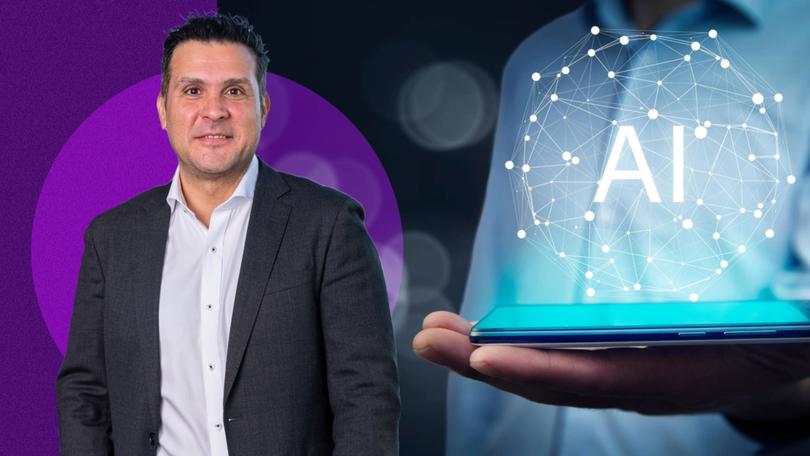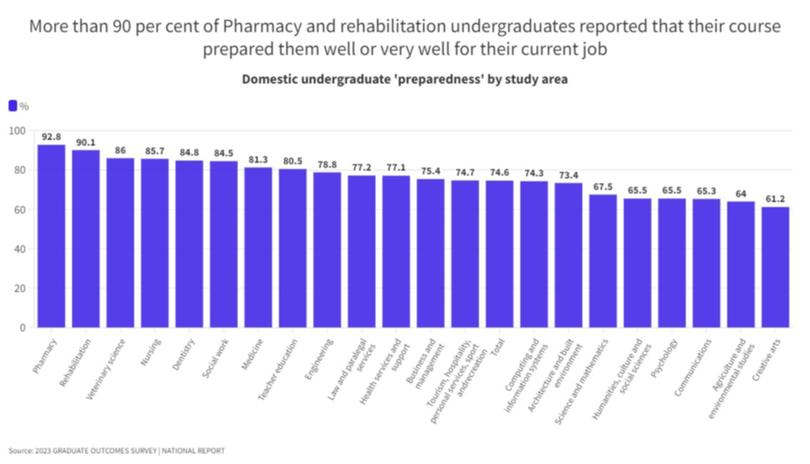LUCIO RIBEIRO: The impact of artificial intelligence on the entry-level job market will be a huge challenge
The job market has always been tough for university graduates, but the class of 2024 faces a new challenge that no other generation has had to face.

The job market has always been tough for university graduates, but the class of 2024 faces a new challenge: pervasive AI technology.
As AI continues to change industries, it can create opportunities for young graduates to innovate, providing fast and accessible tools for young entrepreneurs.
However, it also brings significant challenges, particularly for entry-level roles at risk of automation and businesses’ expectations that applicants are educated in AI.
Sign up to The Nightly's newsletters.
Get the first look at the digital newspaper, curated daily stories and breaking headlines delivered to your inbox.
By continuing you agree to our Terms and Privacy Policy.Graduating in 2024 means entering a job market where AI skills are highly valued and expected. Many companies expect junior applicants to be proficient in AI tools and technologies, adding extra pressure to a competitive job market for recent graduates.
In 2023, the Ministry of Education published research demonstrating that Australian graduates were finding full-time employment at higher rates than at any point since 2009.
The report also measured skills utilisation, illustrating how well the qualification prepared graduates for their current jobs.
In 2023, almost 75 per cent of undergraduates in full-time employment stated that their course had prepared them well or very well for their current job, similar to postgraduate coursework graduates. These results were consistent with 2022.
However, a closer look at the report reveals a lower degree of preparedness in study areas like Creative Arts (61 per cent), Communication (65 per cent), and Psychology (65 per cent), and a higher level of preparedness in science-based studies like Pharmacy (92.8 per cent) and Veterinary (86 per cent).

In the United States, the situation is not the same as companies plan to hire 5.8 per cent fewer new graduates than last year due to the impact of artificial intelligence and automation in entry-level jobs.
This decrease in hiring intensifies the competition among new entrants to the workforce. It’s becoming increasingly crucial for graduates to distinguish themselves from their competitors, not only other candidates but also AI.
Many early-entry white-collar jobs, often involving repetitive tasks, are the most susceptible to automation and are the first to be impacted by the introduction of AI.
Companies are now using AI for tasks that were previously available to new graduates, such as data entry, basic analysis, desktop research, and customer service interactions.
The advent of generative AI tools like ChatGPT has raised concerns about their impact on job opportunities for university graduates.
A 2023 survey by Cengage in the US found that over half (52 per cent) of graduates are worried about being prepared for today’s workforce. Only 41 per cent of graduates felt that their programs had provided them with the necessary skills for their first job, highlighting a significant gap between educational outcomes and employer expectations.

The new recruiter: AI
If it wasn’t enough to get the impact of automation and the need in proficiency in AI, candidates need to convince AI that they deserve an interview with a human.
In today’s job market, Applicant Tracking Systems (ATS) powered by AI have become a standard tool for many Australian employers during the hiring process. These systems automatically filter candidates based on specific keywords related to their experience, education, and skills found in resumes, cover letters, and other documents.
These AI-powered ATS streamline hiring by automating tasks and analysing data. They claim to extract skills and experience from resumes and shortlist applicants, promising to save recruiters time.
Graduate candidates should familiarise themselves with how ATS works to improve their chances of selection.
Here is some guidance for candidates and parents or grandparents who may be assisting their job applications on how to optimise resumes for ATS:
- Customise resumes to align with the job descriptions by incorporating keywords from the job listing and using relevant phrases and acronyms in the skills section. Make it easy for the system to scan and match.
- Spell out acronyms
- To ensure readability, use easily readable fonts and clear headings for different sections, and avoid complex layouts with multiple columns, logos, or photos. These tend to confuse the system. Stick to the classic heading sections such as education, experience, and strengths
- Use a common font such as Helvetica or Arial.
- Test Your CV. Consider using tools like “enhancv.com” to receive feedback and enhance the likelihood of passing ATS filters. Some universities, such as UTS, offer their own tools for students.
Graduates should take proactive steps to prepare for the uncertainties of the AI-influenced job market. This includes learning about new Generative AI tools, understanding how to construct prompts, and learning how AI models function.
Practical advice for parents and grandparents
While AI may reshape the job market, it also unlocks possibilities. The key is to be curious and adaptable.
Equipping graduates with the fundamentals of AI, alongside strong human skills like critical thinking, communication, and creativity, is the recipe for success.
Parents and grandparents can play a necessary role in supporting their children and grandchildren.
They can fuel and instigate their curiosity by exploring online courses or boot camps on AI and other in-demand skills. They can also help them build connections by guiding them to industry events and webinars and fostering professional networks.
Parents’ support is crucial – remind them that setbacks are unfortunately common, and resilience is a skill to build on.
Encourage them to tailor resumes for each job, highlighting their strengths and showcasing their understanding of the specific role. It’s important to stay curious together.
Lucio Ribeiro is a Director of Marketing Digital and Innovation at Seven Network and former university lecturer in Artificial Intelligence and Digital Marketing at RMIT.
